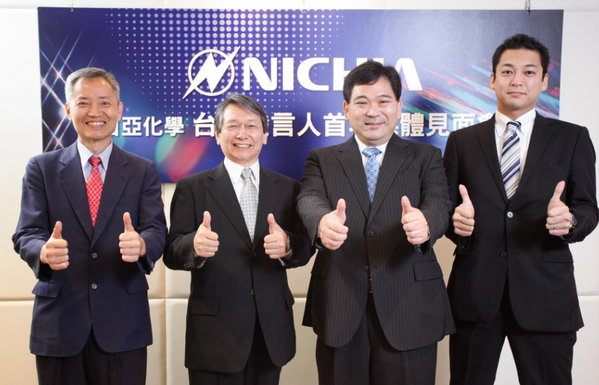Restructures in the LED industry this year have shaken the market, whether it has been Philips decision to spin off its traditional lighting business, or the sudden bankruptcy of sapphire manufacturer GT Advanced Technology. But the worse is to come in 2015, when Chinese LED manufacturers technology matures, said a Nichia spokesperson.
Impact from Chinese manufacturers low-priced LED products
Japanese LED manufacturer Nichia has maintained a positive outlook for 2014 and reported good profits because of Japanese Yen’s depreciation, but the industry’s price competition is expected to intensify in 2015 when Chinese manufacturers start shipping low cost products to Korea and Taiwan markets, said Katsuki Akutagawa, the company’s Board Director and Chief Legal & IP Officer during a press conference in Taipei, Taiwan on Thursday.
Chinese government subsidies have enabled Chinese manufacturers to remain price competitive, and keep product prices lower than Japanese or Taiwanese manufacturers, said Akutagawa. Since the government subsidies cover equipment costs, manufacturers are pricing LED products based on operation costs, making it very difficult for foreign companies to compete. “It is basically unfair competition,” said Masaki Mukaiyama, special consultant and spokesperson of Nichia Taiwan Corporation.
Impact from Chinese manufacturers’ products is projected to challenge Nichia’s current global LED market share. “We believe it will be difficult to maintain our global LED market share of 22 percent next year because of competition from Chinese manufacturers”, said Akutagawa. The company is a world leader in LED and phosphor business, and has a global market share of 25 percent in the phosphor industry. Nichia’s ED business amounted to nearly 90 percent of its US $3 billion revenue for 2014, while the remaining 10 percent is from lithium battery sales.
|
Market Sector
|
Nichia’s Global Market Share
|
|
LED
|
22%
|
|
Phosphor
|
25%
|
|
Lithium battery
|
15%
|
|
|
(Source: Nichia) |
The Korean lighting market is already showing signs of negative effects from importing low-priced Chinese products, with leading Korean manufacturers including Samsung, Seoul Semiconductor and LG reporting losses in its LED business in recent years, said Akutagawa. Many Korean manufacturers prefer buying and assembling cheap Chinese manufacturers LED products instead of purchasing domestic manufacturers LED products, making it increasingly difficult for Korean LED manufacturers to profit. “Korean (LED) manufacturers are falling behind due to weak patent foundations, which forces them to engage in price competitions,” added Akutagawa.
Next year will mark the beginning of serious competition from Chinese manufacturers, projected Akutagawa. “Chinese manufacturers will be more prepared to compete on a large scale in 2015,” said Akutagawa.
“Chinese manufacturers LED (manufacturing) technology will become more mature next year,” explained Mukaiyama. Chinese manufacturer San’an Opto for instance has headhunted engineers from Taiwanese LED companies Epistar and Genesis Photonics Inc. (GPI) from 2011 to 2012, when these employees leave they also bring with them years of research results and technology know-how. This significantly speeds up the time required for Chinese manufacturers to develop new LED technology, and will further lower LED prices.
 |
|
Left to right: Masaki Mukaiyama, Special Consultant and Spokesperson, Nichia Taiwan, Katsuyuki Akutagawa, Chief Legal & Ip Officer and Board Director, Legal and Intellectual Division, Nichia, Hinori Takagi, General Manager, Intellectual Property Dept., Legal & Intellectual property Division, Nichia, Yuto Iwasa, Assistant Research Scientist, Intellectual Property Dept., Legal and Intellectual Property Division, Nichia. (Photo Credit: Nichia) |
Nichia’s strategy in the face of rising Chinese manufacturers
To retain leadership position in the LED business, there are two distinctive business strategies that Nichia can implement, said Akutagawa. The first is early technology investments and acquisitions of key intellectual properties as seen in its GaN blue LED investments, or improve product features and functionality. Akutagawa declined to comment on the new technologies the companies is focusing on after GaN blue LEDs, stating the company decided not to publicize related details. However, the company’s long record of R&D investments surpassing revenue from 1993 to 2001, shows its dedication to long term research.
The company is also searching for methods to add value to its LED products. Nichia’s LEDs can be found in popular consumer electronic backlight including Apple’s iPhones and iPad, as well as Chinese mobile manufacturer Xiaomi smartphones, said Akutagawa. However, residential luminaires will become an increasingly important market, where strength in phosphor technology and LEDs will give the company an advantage. Additionally, Nichia is also supplying Mn 4+ red phosphors for Sony’s 4KTV LEDs.
Mukaiyama did not comment on whether the LED industry might follow in the solar industry’s footsteps of launching trade wars and tariffs, but noted oversupply is a serious issue in any industry that needs to be adequately addressed. “Any industry the Chinese decide to enter will be dyed from a blue to red market,” said Mukaiyama. “China has gone from PV to LED and the next step will be semiconductors.” With Chinese government significantly bringing down LED prices, it will be increasingly important for manufacturers to develop key technology and expand their patent portfolio to cushion the blow from low-priced Chinese LEDs.
(Author: Judy Lin, Chief Editor, LEDinside)





 CN
TW
EN
CN
TW
EN






